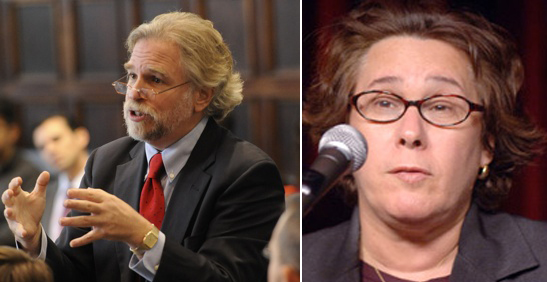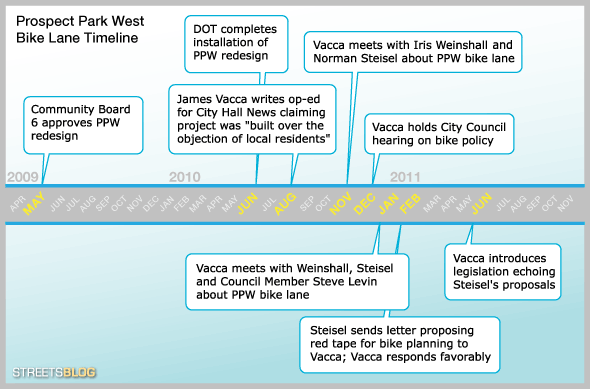Last week, opponents of the Prospect Park West redesign moved to appeal Brooklyn Supreme Court Justice Bert Bunyan’s decision to reject their complaint against the city. If the community board’s approval of the bike lane and the data showing its effect on speeding and safety didn’t persuade them not to sue in the first place, a judicial decision wasn’t going to persuade them now. The longer the litigation drags on, the more time they’ll have to muddy the truth.
Since the case is still in the courts, though, we’ve also got more time to get a clearer look at the anti-bike lane group “Neighbors for Better Bike Lanes.” Based on email correspondence obtained via freedom of information request, we now have a better sense of NBBL’s methods -- how they’ve exploited their connections to politicians, media personalities, city bureaucrats, and various New York City power players in their attempt to erase the new bike lane in their neighborhood.

Let’s begin with the connection that set the lawsuit on its path to becoming a media spectacle: NBBL’s access to Gibson Dunn partner Randy Mastro.
Actually, first let’s pause to appreciate a classic NBBL exercise in muddying the truth. In the run-up to suing the city, you may recall that NBBL adopted the posture of reluctant litigants. “Much has been said about a potential legal action; we hope not to be forced to bring one,” said their attorney, Gibson Dunn partner Jim Walden, shortly before filing the suit. At the time, in late February, NBBL and Walden had been grabbing headlines for a few weeks, talking about litigation as a supposed last resort.
In fact, his firm had been planning a lawsuit with former DOT Commissioner Iris Weinshall and the leaders of NBBL for more than seven months. Gibson Dunn provided this service “pro bono.” The person who first offered the use of the firm’s resources to assist Weinshall was Mastro, who co-chairs Gibson Dunn's litigation arm.
Weinshall and Mastro were not strangers. Both served in Rudy Giuliani’s mayoral administration – Mastro as chief of staff and later first deputy mayor, Weinshall as a high-ranking official in the Department of Citywide Administrative Services and then as DOT commissioner.
On July 3, 2010, Weinshall emailed her daughter, Jessica Schumer, a recent graduate of Yale Law School who campaigned vigorously against the bike lane that summer. "Spoke with Randy mastro he said he would help you with the article 78!" she wrote [PDF]. (An "Article 78" refers to the type of lawsuit opponents eventually filed in their bid to tarnish DOT and erase the bike lane.)
DOT had just finished installing the bike lane the month before. Practically before the paint was dry, Weinshall had enlisted a lawyer who runs one of the nation's top litigation practices -- a man who represents the world's corporate behemoths in court -- to help wage her local NIMBY battle.
Schumer herself connected with Mastro two weeks later. "Just got off the phone with randy mastro and I'm pretty sure we have pro-bono representation from a top nyc law firm (gibson dunn)," she wrote in a message [PDF] to NBBL president Louise Hainline and another member of the group, Lisa Napolitano.
Then on July 22, Hainline wrote to fellow bike lane opponent Lois Carswell [PDF] to inform her that "the Randy Mastro connection has gotten us two attorney's at Randy's firm" as well as "many interns or first year attorneys."
When law firms donate their time and energy to clients who are not poor (Hainline and Carswell own some of the most desirable real estate in Brooklyn), it's considered ethical practice for a committee to decide if the case is appropriate for pro bono work. Gibson Dunn has not responded to inquiries about whether their pro bono committee voted on giving NBBL free legal services.
We don't know exactly why Mastro agreed to help Weinshall. Neither of them would comment for this piece. We do know, however, that Weinshall was concerned about that information leaking out. On February 6, 2011, after Hainline mentioned that NPR's Andrea Bernstein had been asking about Mastro, Weinshall wrote a short email in response. It said simply: "We should never say how we got Randy!"






